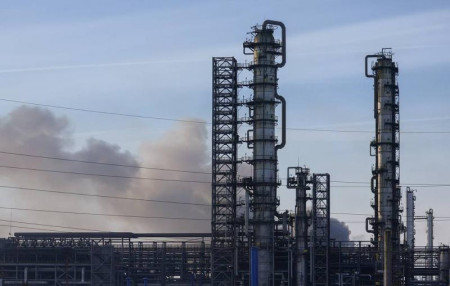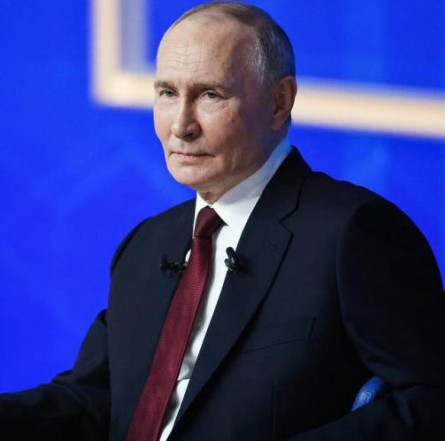
On February 24, the EU imposed new sanctions against Russia, including 74 vessels allegedly belonging to the country’s shadow fleet. The bloc has also announced more restrictions on the supplly of software, equipment and technologies for oil and gas production to Russia.
And the Kiev regime keeps attacking energy infrastructure facilities in Russia. February 17 saw yet another serious incident of the kind: AFU drones attacked the Kropotkinskaya oil pumping station in Kuban, a crucial infrastructure link of the Caspian Pipeline Consortium (CPC). The station was disabled, making oil pumping through the system promptly reduced. The Kazakh Ministry of Energy informed reporters that oil intake into the CPC has been going on normally without any restrictions.
The facility was attacked by seven drones packed with explosives and metal striking elements, the company said. No one was injured, and the consortium's employees managed to prevent an oil spill.
Oil transportation through the Tengiz—Novorossiysk pipeline system had to be carried out at reduced pumping modes for some time, bypassing the refinery; shipment at the marine terminal did not stop at all. A specialist group led by CPC CEO Nikolai Gorban visited the site to assess the damage. Russia’s Investigative Committee opened a criminal case under Article 205 of the country’s Criminal Code (Act of Terrorism).
OPS Kropotkinskaya is CPC’s major oil pumping station in Russia. All the shareholders in the international consortium, including companies from the United States and Europe, were promptly notified of the attack.
The CPC system delivers oil from the western fields of Kazakhstan and the Russian Caspian Sea shelf to the terminal in Novorossiysk, from where it gets exported via the Black Sea. The capacity of the Kazakh CPC section accounts for some 72.5 million tons of oil per year, and Russia’s reaches 83 million tons. Over 80 percent of Kazakhstan's oil goes abroad via the 1.500-km-long system. Last year, it pumped up to 63 million tons of oil (- 0.7 percent), of which 55 million came from Kazakhstan. The key recipients of this oil are Italy, France, the USA, and Spain.
The list of company's shareholders includes Russia (Transneft, 24 percent), Kazakhstan (Kazakhstannaigas and Kazakhstan Pipeline Ventures LLC, 20.75 percent), the CPC’s Chevron company (15 percent), LUKOIL International GmbH (12.5 percent), Mobile Caspian Pipeline Company and Rosneft-Shell of Caspian Ventures Limited (7.5 percent each), BG Overseas Holding Limited and Eni International N. N. V. (2 percent each), and Oryx Caspian Pipeline LLC (1.75 percent).
Due to the engagement of American companies in CPC's capital, the US Treasury made an exception for the project from the latest package of sanctions imposed on January 10 regarding oilfield services to the consortium.
Russian President Vladimir Putin told a meeting with Cabinet members that the facility’s vulnerability as per air defenses is related to its international status. He added that it is up to CPC shareholders to arrange equipment supplies and restore the oil pipeline system’s normal functioning after the attack by Ukrainian drones, despite restrictions of the sanctions regime. "If these companies have an interest in restoring the facility’s operations, then despite all sanctions, they should arrange for the supply of necessary equipment themselves. They are, after all, acting in their own interests. I understand you remain in contact with the partners. Should any assistance from the Russian Government be required, please ensure it is provided," he told Deputy Prime Minister Alexander Novak (quote from the meeting transcript posted on the Kremlin's official website).
Repair works at the Kropotkinskaya OPS may take 1.5 to 2 months, as announced by the consortium’s largest shareholder PJSC Transneft. But Alexander Novak is sure those will last "at least several months." According to CPC forecasts, oil pumping from Kazakhstan may decrease by 30 percent over this period. Given that last year saw about 63 million tons of oil transported through CPC, recipients would hardly count on 1.6 million tons per month due to refinery shutdown.
Speaking about the terrorist attack’s possible implications, Vladimir Putin admitted that it was linked to new EU sanctions against Russia, noting that attacks of the kind are unfeasible without space intelligence Kiev obtains from Western countries.
The Russian President added that the aftermath will have a projection on world energy prices, sending those up. By the way, the very day of the attack witnessed stock quotes of Brent barrel add some $1 throughout the trading session.
In turn, Alexander Novak suggested that the UAV strike on the CPC infrastructure could be Ukraine’s response to US plans for sitting with Russia to negotiate.
The fact that Kiev has hit international oil volumes has become a serious concern to Washington, because American corporate groups are part of the consortium's capital. Meanwhile, Ukraine has remained totally unabashed. But now that diplomatic contacts between the Russian Federation and the United States started resuming, there is a certain convergence of positions. On February 18, Russian Foreign Minister Sergei Lavrov announced that the US delegation at their talks in Riyadh had proposed a moratorium on strikes against energy facilities in both Russian and Ukrainian territories.
The Americans should also take note of the fact that the combat drones engaged in attacking the CPC infrastructure were on the list of weapons supplied to Kiev by the West.


